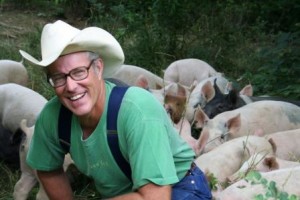 🖨️ Print post
🖨️ Print post
Joel Salatin is likely one of the most influential farmers on the face of the planet. He runs Polyface Farms in the Shenandoah Valley in Virginia. For decades he has been an influential author and speaker; a prominent advocate of the sustainable, regenerative agriculture movement. With humor and honesty, he always tells it like it is. One of his most popular books, “Folks, this ain’t normal,” was recently translated into Spanish.
We caught up with him shortly after some recent travels to Australia, Austria, Spain, and more. In today’s interview, he gives us his perspective on farming around the world. Along the way, he weighs in on imitation meat, how limited the “organic” label can be, and why Americans may be more willing to buck the government than Europeans. After going global with Joel, we get hyperlocal and swing back around to Polyface, and then to our own backyards. How can we eat more locally? What changes can we make to live in a way that’s better for the world and our health, too? Prepare to be challenged and entertained as he answers these questions and more.
Notes:
Highlights from the conversation include:
- how Joel saw a lot of changes in Spain since he taught there five years ago
- the differences between countries on what is considered sanitary (for example, in the EU you can’t sell washed eggs while in the US you can’t sell eggs that haven’t been washed)
- how in the US we find many loopholes to go against regulations on food
- how in Austria farming is mechanic, all things in buildings, even certified organic, because they feel they can’t handle things in a precise way otherwise
- how the Netherlands is the world’s second largest exporter of agricultural goods on the basis of bringing in Brazilian and Paraguay’s grain and sending dehydrated manure back to Brazil and Paraguay for fertilizer (a system that is not sustainable)
- how there’s a referendum that will require dairy farmers to only have as many cows as they can feed on their own forage
- the problem of manure in the Netherlands
- how fake meat isn’t healthy, and isn’t the solution
- how many of the best regenerative agriculture systems have come from Australia
- the impressive vineyards by the Danube in Austria
- the wise traditions Joel has incorporated at his own farm–including pasture cropping and keyline irrigation
- what we can do at home to grow nutrient-dense food and promote spiritual connections with our food and the earth–composting, planting herbs, having chickens, honey bees
- the importance of getting most of your food from local integrity farmers (as even organic certifications can’t be trusted at times)
- how we can’t separate ourselves from food and food preparation and expect a good outcome
- how wise traditions starts with a kitchen-centric type of life
Resources:
Joel’s blog –
Polyfacefarms.com

Leave a Reply